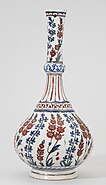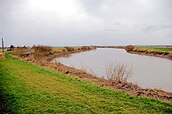Introduction · Almanac · Categories · Glossaries · Lists · Overviews · Portals · Questions · Site news · Index
Welcome to Wikipedia Information
As of 11:28, Tuesday, July 23, 2024 ( UTC), Wikipedia has 6,856,831 articles and 47,712,351 users. ( to refresh)
|
|
Geography |
|
History |
|
Film |
|
Biography |
|
Health |
|
Technology |

Flask from Iznik,
c. 1560–1580 Empire of the Sultans was a touring exhibition from 1995 to 2004 displaying objects from the Khalili Collection of Islamic Art. Around two hundred exhibits, including calligraphy, textiles, pottery (example pictured), weapons, and metalwork, illustrated the art and daily life of six centuries of the Ottoman Empire. Many of the objects had been created for the leaders of the empire, the sultans. Two of the calligraphic pieces were the work of sultans themselves. In the 1990s, the exhibition was hosted by institutions in Switzerland, the United Kingdom, and Israel, and its first catalogue was published by J. M. Rogers. The exhibits visited thirteen cities in the United States from 2000 to 2004, despite controversies in the wake of the September 11 attacks and the Iraq War. Critics described the exhibition as wide-ranging and informative. They praised it for showing beautiful art works – naming the calligraphy in particular – and for presenting a fresh view of Islam. ( Full article...)
Recently featured:
|
|
|
|
July 23: Seventeenth of Tammuz (Judaism, 2024), Birthday of Haile Selassie ( Rastafari)
|
|
|
|
Censorship under the military dictatorship in Brazil consisted of restrictions on the media, artists, journalists, and others which the government deemed "subversive", "dangerous" or "immoral". The political system of the
Brazilian military dictatorship, installed by a
1964 coup d'état and which persisted until 1985, also set out to censor material that went against what it called "morality and good manners". The
constitution of 1967 established censorship as an official, centralized activity of the Brazilian federal government. There were several protests against the practice, including the Cultura contra Censura protest in February 1968, depicted in this photograph, which shows the actresses
Tônia Carrero,
Eva Wilma,
Odete Lara,
Norma Bengell and
Cacilda Becker.Photograph credit: unknown; restored by
Adam Cuerden
|
|
Every page on Wikipedia is a collaborative effort. But there are some special places reserved for specific types of discussion and assistance. Find what you're looking for here:
|
|
Wikipedia is written by volunteer editors and hosted by the Wikimedia Foundation, a non-profit organization that also hosts a range of other volunteer projects:
|
|
This Wikipedia is written in English. Many other Wikipedias are available; some of the largest are listed below.
|
Introduction · Almanac · Categories · Glossaries · Lists · Overviews · Portals · Questions · Site news · Index
Welcome to Wikipedia Information
As of 11:28, Tuesday, July 23, 2024 ( UTC), Wikipedia has 6,856,831 articles and 47,712,351 users. ( to refresh)
|
|
Geography |
|
History |
|
Film |
|
Biography |
|
Health |
|
Technology |

Flask from Iznik,
c. 1560–1580 Empire of the Sultans was a touring exhibition from 1995 to 2004 displaying objects from the Khalili Collection of Islamic Art. Around two hundred exhibits, including calligraphy, textiles, pottery (example pictured), weapons, and metalwork, illustrated the art and daily life of six centuries of the Ottoman Empire. Many of the objects had been created for the leaders of the empire, the sultans. Two of the calligraphic pieces were the work of sultans themselves. In the 1990s, the exhibition was hosted by institutions in Switzerland, the United Kingdom, and Israel, and its first catalogue was published by J. M. Rogers. The exhibits visited thirteen cities in the United States from 2000 to 2004, despite controversies in the wake of the September 11 attacks and the Iraq War. Critics described the exhibition as wide-ranging and informative. They praised it for showing beautiful art works – naming the calligraphy in particular – and for presenting a fresh view of Islam. ( Full article...)
Recently featured:
|
|
|
|
July 23: Seventeenth of Tammuz (Judaism, 2024), Birthday of Haile Selassie ( Rastafari)
|
|
|
|
Censorship under the military dictatorship in Brazil consisted of restrictions on the media, artists, journalists, and others which the government deemed "subversive", "dangerous" or "immoral". The political system of the
Brazilian military dictatorship, installed by a
1964 coup d'état and which persisted until 1985, also set out to censor material that went against what it called "morality and good manners". The
constitution of 1967 established censorship as an official, centralized activity of the Brazilian federal government. There were several protests against the practice, including the Cultura contra Censura protest in February 1968, depicted in this photograph, which shows the actresses
Tônia Carrero,
Eva Wilma,
Odete Lara,
Norma Bengell and
Cacilda Becker.Photograph credit: unknown; restored by
Adam Cuerden
|
|
Every page on Wikipedia is a collaborative effort. But there are some special places reserved for specific types of discussion and assistance. Find what you're looking for here:
|
|
Wikipedia is written by volunteer editors and hosted by the Wikimedia Foundation, a non-profit organization that also hosts a range of other volunteer projects:
|
|
This Wikipedia is written in English. Many other Wikipedias are available; some of the largest are listed below.
|




